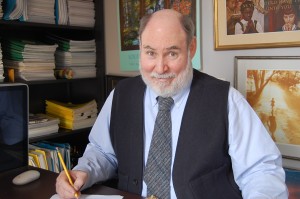
John Paulmann, retiring professor of Communication at Westfield State University. (Photo: westfieldalumni.org)
WESTFIELD – The corner office is among the most coveted for professionals of all types in America, a symbol of authority, commanding the utmost respect.
There may be no corner office-occupier quite as unique as John Donoghue Paulmann, a professor of Communication at Westfield State University, whose impending retirement marks the end of an era for a department and an institution.
Long a fixture in the third floor corner office of the Ely Campus Center, the sight of the bald, bearded and jovial professor, decked out in his uniform – vest, woven tie and grey New Balance sneakers – has been a source of great joy and inspiration for students at the university since he arrived in the mid ’80s, dishing out thousands of coughdrops and ‘cheers’ along the way.
“My grandmother and her sister, who was born in Ireland, went here and went back to their hometown, Great Barrington, to teach,” said Paulmann, who grew up outside New York City and holds communication degrees from Fordham, Columbia and New York University. “They spent their whole lives taking Westfield State values into the classroom.”
A native of New Rochelle, the 66-year old Paulmann’s upbringing in a tight-knit Irish Catholic family only a trainride from The Bronx imparted upon him the demeanor and wisdom which he has passed down to his students for over 25 years.
“It was an audio-visual job south of Yonkers in Riverdale on the Hudson called the College of Mount St. Vincent, and I was there for about three years,” he said of his humble beginnings prior to Westfield. “This wonderful nun, Sister Mary Byrne, asked if I wanted to teach a class. So she gave me a book and I did a chapter a week, and I got to like it very much, enough that I decided to go back to school.”
Paulmann’s odyssey toward receiving his doctorate from NYU lasted over 12 years, as he would alternate working for a year and attending school the next.
“It ended in April of ’86, but April is too late to apply for a teaching job,” said Paulmann as he recounted the months leading up to his arrival in Westfield. “I just blasted a bunch of resumes out, didn’t even bother to look where they may be openings, and there was one here.”
“I didn’t seek it out – I was looking for a job, but I didn’t realize where it would be – and then I realized this is the school my grandmother went to,” he said of one of the many kismet moments of his life. “My first apartment, on Day Avenue, half a block from the corner of Court Street, I could see the City Hall – the building my grandmother went to school in.”
When asked how the department has evolved since he began at the university, Paulmann stated that a sea change has occurred in a variety of aspects within the department and that it’s not done.
“If you’re starting out now, you’re going to use social media, all kinds of online sites, maybe even have pre-selected learning modules online,” he said. “I think it’s going to be pretty stable like that for awhile, but it may also go in a direction of mini-modules, which people can kind of custom connect and stitch together, just as we prepare a course in print. Or maybe things will settle down and online becomes basically an enormous set of resources with a human component.”
Regardless of how the landscape of education shifts, Paulmann believes that the main incentive for people to go into education and for educators to continue teaching will always remain the same.
“It’s about the students. The whole story here is students,” Paulmann said of his inspiration, who has kept him here, and who he will miss most. “Students never owe teachers anything… teachers owe students for making a fantastic life possible.”
When asked how he will spend the next few months of his post-Westfield State life, Paulmann, who resides in Russell but has travelled alone and with students all over the world, said he is looking forward to doing the same pilgrim walk he made last summer, the Camino de Santiago.
A walk of over 500 miles that begins in the French Pyrennes village of Ronceveaux, and ends in Spain at the Cathedral at Santiago, the Portico da Gloria, it is a trek that Paulmann believes is a truly spiritual adventure.
“It’s like a gigantic bath from the inside, it cleans everything out,” he said of the walk, likening it to the Hajj, a pilgrim made by Muslims every year to Mecca in Saudi Arabia. “You lose a little weight, gain a little strength, but everything about your life is alive, you have a livelier step.”
“When you don’t know if you’re going to make it to the next hostel that night, you literally put all your steps into a spiritual place. And you get there,” he continued. “This is inexplicable to most westerners who operate on a much more rational and predictable basis. ‘If you don’t have gas in the tank, why would you make the trip?’ With a Camino it’s different – you get the gas as you go along.”

